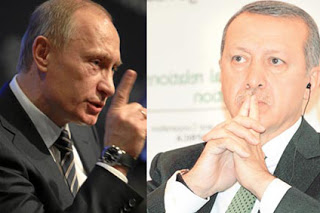Since the shootdown of a Russian Su-24 by the Turkish Air Force on the 24th of November, Russia has escalated its bombing campaign in Syria against rebel groups in the north of Syria, including ones the US calls ‘moderate forces’.
Some of these groups have the backing of the US & Turkey and have been actively fighting against both the Assad regime and ISIS for some time.
Russia is striking back after a “stab in the back by an accomplice to terrorists” by changing the “game” in Syria.
Ankara never received international backing for a safe zone across its border, but Russia has now ruled that out.
The deployment of S-400 anti-air missiles means Russia has effectively imposed a no-fly zone over Syria.
Aside from indirect military deployments, Russia has been hitting back at Turkey in other ways, such as arresting Turkish businessmen, banning Russian football clubs from signing Turkish players and seizing Turkish cargo ships. The Russian government has even gone so far as to pursue economic sanctions against Turkey, and discouraging Russian tourists from visiting.
Moscow’s retaliation is not just about severing economic and diplomatic ties. It is pursuing a policy that could tie Turkey’s hands in Syria.
Moscow seems to be moving closer to a group that has been the US-led coalition’s main ground force in Syria – a group which Turkey, itself a member of that coalition, calls “terrorists”.
The Syrian Kurdish forces (YPG) is a US-backed Kurdish group that has pushed the Islamic State of Iraq and the Levant (ISIL) back from areas along the border with Turkey.
In an attempt to change the solely “Kurdish face” of anti-ISIL ground troops, it aligned with some Arab brigades to form “the Syria Democratic Forces” (SDF).
No doubt a further strengthened YPG will anger Turkey, which has long feared that Kurdish autonomy in northern Syria would stir up similar sentiments among its own Kurdish population.
The SDF are now engaged in a fierce battle with Turkey-backed opposition factions in what is considered to be an important corner of Syria – the northern countryside of Aleppo.
To be more specific: the area west of the Euphrates River, which Turkey calls a red line.
The SDF captured some opposition-controlled towns close to the Turkish border of Kilis – known in Syria as Bab al-Salameh, an important lifeline for rebel groups.
In the latest salvo in the war of words between the two countries,Russia publishes ‘proof’ Turkey’s Erdogan is smuggling Isis oil across border from Syria
Russia has unveiled what it describes as proof that Turkish president Recep Tayyip Erdogan and his family have benefited from the illegal smuggling of oil from Isis-held territory.
Moscow defence ministry officials released satellite images they claim shows columns of tanker trucks loading with oil at an installation controlled by Isis in Syria, before crossing the border into Turkey.
Footage was also sent out by the Kremlin that purported to show a flow of lorries crossing the Turkey-Syria border with no restrictions at the Reyhanli checkpoint.
Russia officials did not specify what direct evidence they had of the involvement of Mr Erdogan and his family, an allegation the Turkish president has vehemently denied.
Anatoly Antonov, Russia’s deputy defence minister, said: “Turkey is the main consumer of the oil stolen from its rightful owners, Syria and Iraq.
“According to information we’ve received, the senior political leadership of the country – President Erdogan and his family – are involved in this criminal business.”
Mr Antonov admitted that he may have been “too blunt” in levelling the allegations, adding: “In the West, no one has asked questions about the fact that the Turkish president’s son heads one of the biggest energy companies, or that his son-in-law has been appointed energy minister. What a marvellous family business.”
